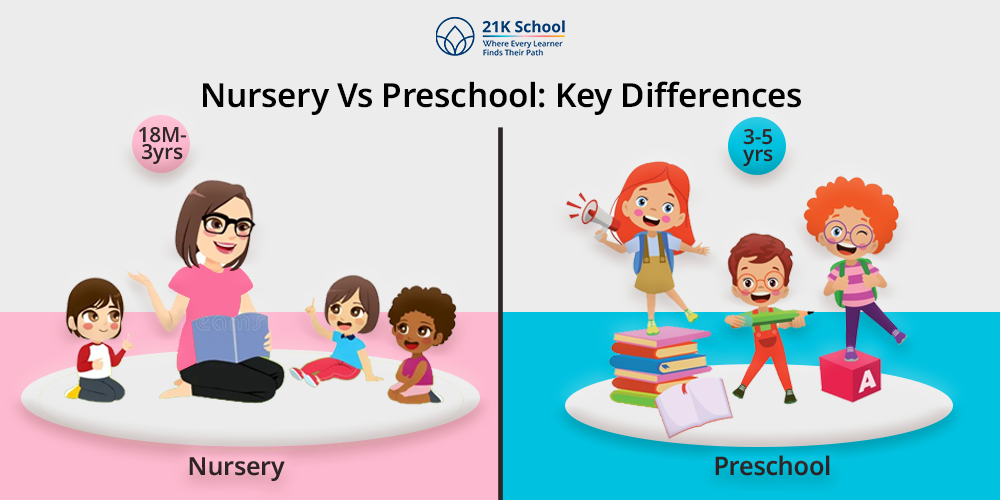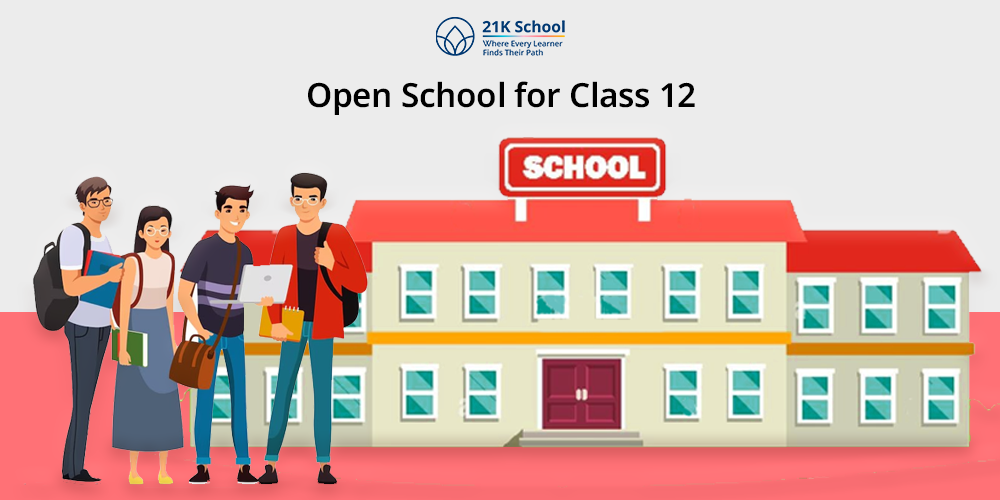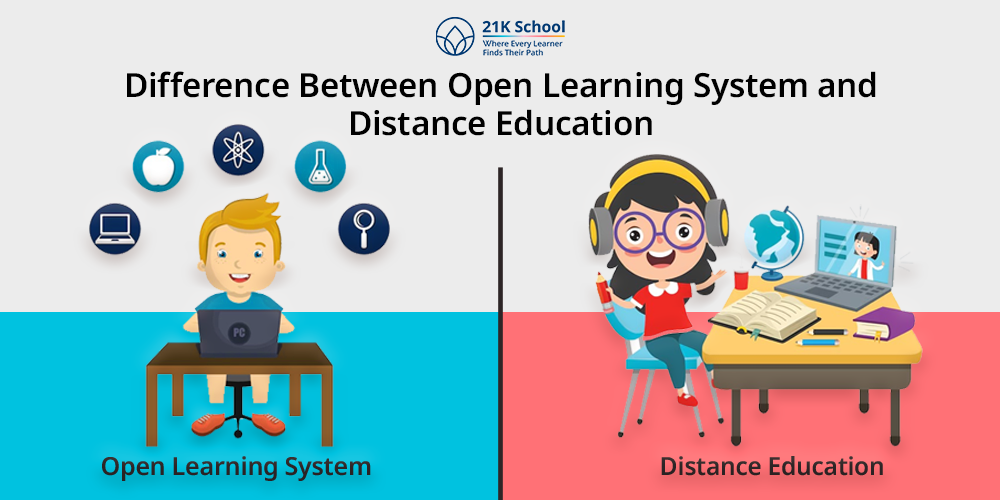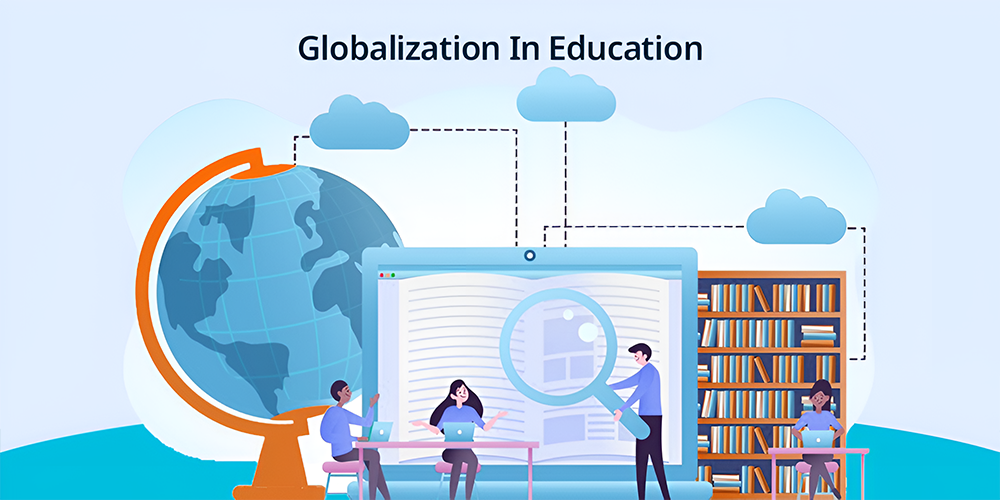
Imagine if, by crossing the threshold of your classroom, students of the world and their ideas walked through the door, bringing with them the perspectives of a global society?
It is the magic of globalization as far as education is concerned.
It is not only changing how learners learn or how faculty teach, but also how they engage and develop within the global context.
Here in this new age, classrooms have no walls and ensure that the students learn how to share and collaborate from across the globe. It also like preparing to lead a worldwide tomorrow.
It has encouraged knowledge interaction that has done away with barriers, allowing students to learn from other students.
From learning where the students and teachers are separated by the sea to exchange programs, we have come a long way, as we all are aware of. Also, Technology Changing Education and taking it to the next level.
But as with these new opportunities come new strains: equity and the maximization of cultural differences.
Now, let’s explore how globalization is transforming education today and its implications for learners, educators, and learning.
Contents
What is Globalization in Education?
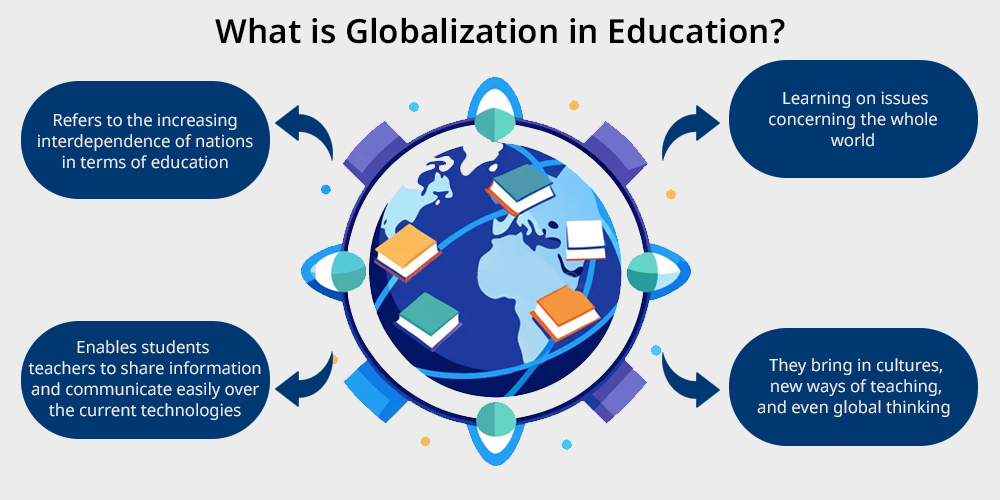
Globalization of education refers to the increasing interdependence of nations in terms of education delivery and receipt, delivery, and receipt of educational knowledge and material.
It enables students and teachers to share information and communicate easily over the current technologies, like the webpage and use of other facilities.
They bring in cultures, new ways of teaching, and even global thinking in preparation for the global economy into classrooms.
It fosters learning on issues concerning the whole world, such as global warming and social justice. Teachers also should stay updated with the tips for Online Teaching to Make Online Classes a Success.
But there are some problems that arise with globalization, for instance, inequitable distribution of resources, and chances are that our cultures may be washed away by the tidal waves of global education.
However, it also means that trying to strike a balance between the global trends and the domestic requirements is the way to provide equal advantages to everybody.
Globalization of Education in India
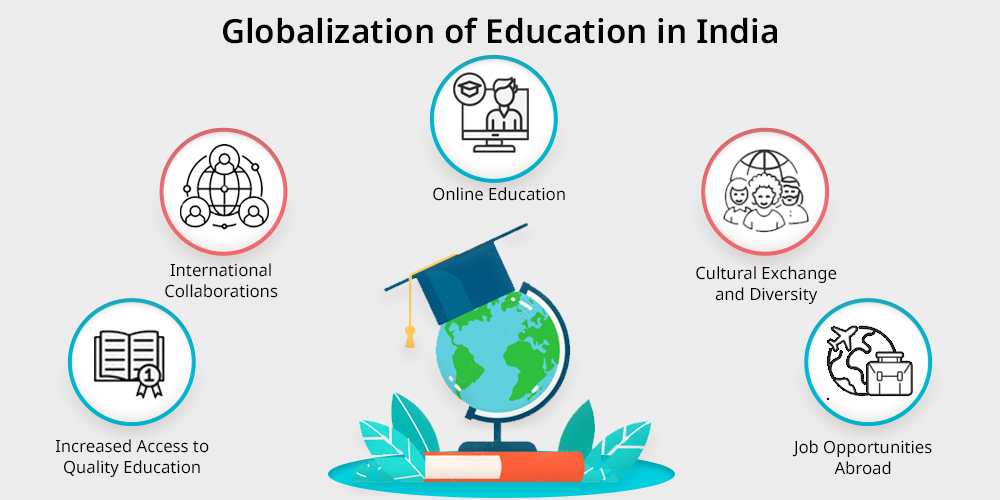
The globalization of education has played a new significant role in the shaping of education systems in India. It is primarily against this backdrop of a rising India that the need for a more open and globally competitive system of education has come to be widely felt.
Major reasons for such transformation include technology development, innovation, foreign integration, and the ability to prepare students for the global employment market.
- Increased Access to Quality Education: Since globalization, there is availability of international curricula, research, and other resources at Indian institutions. Students can get themselves exposed to quality education without venturing outside the country.
- International Collaborations: Indian universities have increasingly been coming up with international linkages for student exchange, research, and CG programs. They have been enhancing the experience, variety, and quality of students.
- Online Education: Thanks to e-learning platforms, students in India can attend classes in some of the best universities across the world, and in many cases, location and cost are not an issue.
- Cultural Exchange and Diversity: Globalization makes available in the Indian context some cultures, ideas, and teaching techniques that otherwise may not get introduced in the Indian campus.
- Job Opportunities Abroad: When Indian students secure international degrees, they are in a position to secure international experience. It also helped boost the workforce in India in various fields.
Why is Global Education Important?
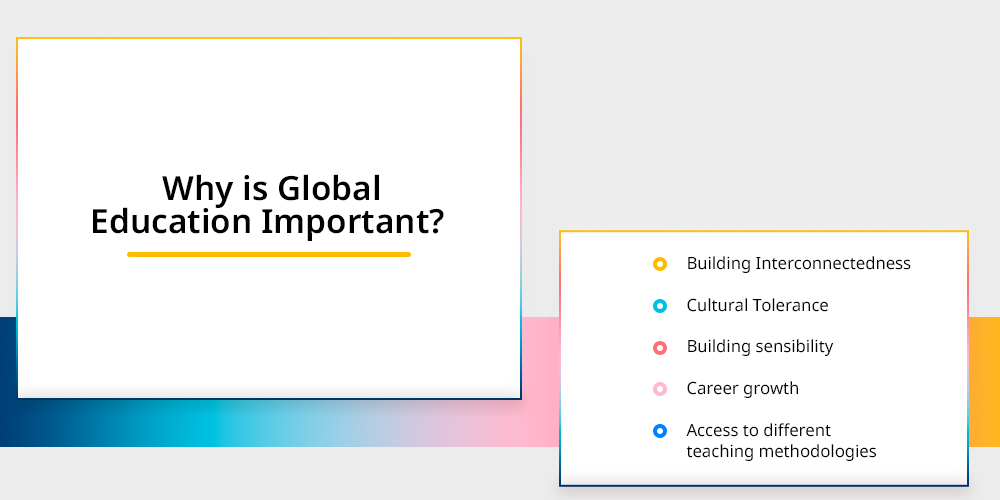
Global education is relevant because it assists people in overcoming the complexities of a world that is rapidly developing with a focus on interconnectivity.
Since the world is more interconnected than ever, global education helps individuals become ready for the interconnected globe or the society they live in.
Below are some reasons why global education is essential:
1. Building Interconnectedness
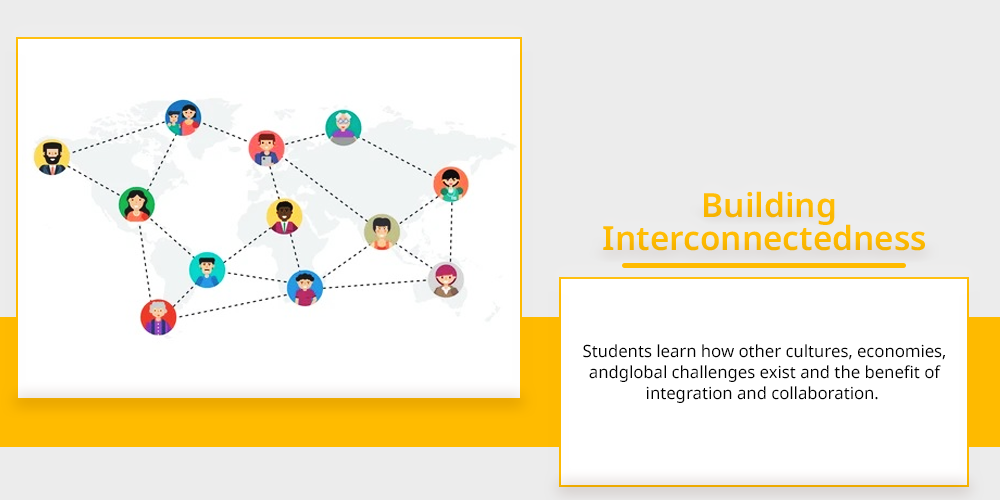
Global education makes the students aware of how integrated the world actually is. In contemporary society, occurrences and choices in one section of the world can affect others.
Students learn how other cultures, economies, and global challenges exist and the benefit of integration and collaboration.
This connectedness equips people for interacting with people from every part of the world. However, it also helps in fostering a sense of global interdependence for problems.
2. Cultural Tolerance
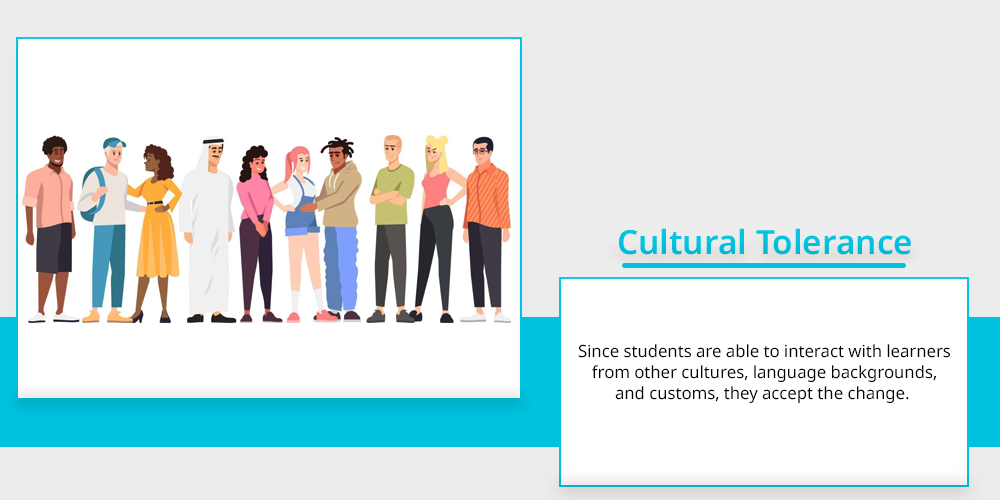
Many scholars have said that one of global education’s most valuable processes or values is respecting intercultural diversity.
Since students are able to interact with learners from other cultures, language backgrounds, and customs, they accept the change.
It means promoting understanding and fighting prejudice in the world, which results in a more tolerant and safe society. The cross-cultural tolerance enables people to have improved relationships with people from other cultures.
3. Building Sensibility
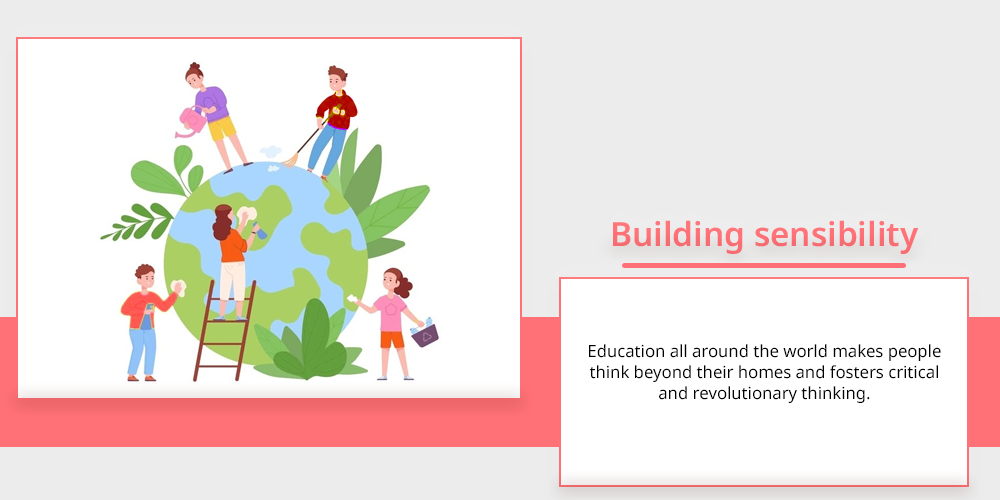
Education all around the world makes people think beyond their homes and fosters critical and revolutionary thinking.
They challenge students to search for meaning in the world’s complications, including poverty, climate change, and inequality.
As such, students get to be more sensitive to the plight of others but also get an understanding of issues affecting the world.
This creates awareness and a sense of action through volunteering, supporting global causes/charities. Moreover, it also makes conscious decisions that improve the world.
4. Career Growth

International awareness is invaluable because of the global interconnectedness of business and economies currently.
Global education enables students to develop the skills and acquire the knowledge that would enable them to operate on the global platform.
Studying languages, international business, and cross-cultural communication gives so many directions to consider for a career.
International perspectives are important for employers since they allow employees to operate in diverse conditions and can participate in global tasks and projects.
5. Access to Different Teaching Methodologies
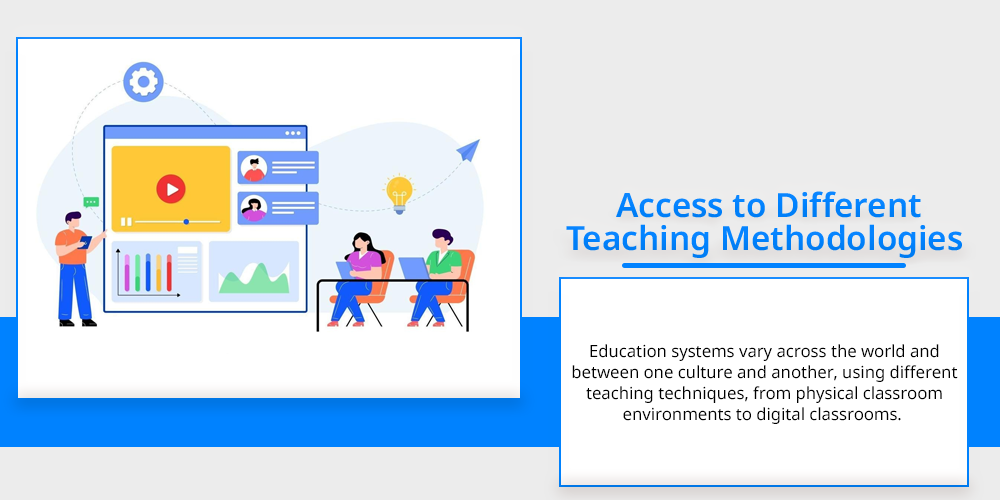
Global education also helps students to be acquainted with various forms of teaching and learning approaches.
Education systems vary across the world and between one culture and another, using different teaching techniques, from physical classroom environments to digital classrooms.
The student can be exposed to other techniques of handling lessons. They can discover those techniques that suit him or her best. Also, exposure to other countries’ education systems puts pressure on the teachers to adapt to better teaching methods.
What are the Goals of Global Education?
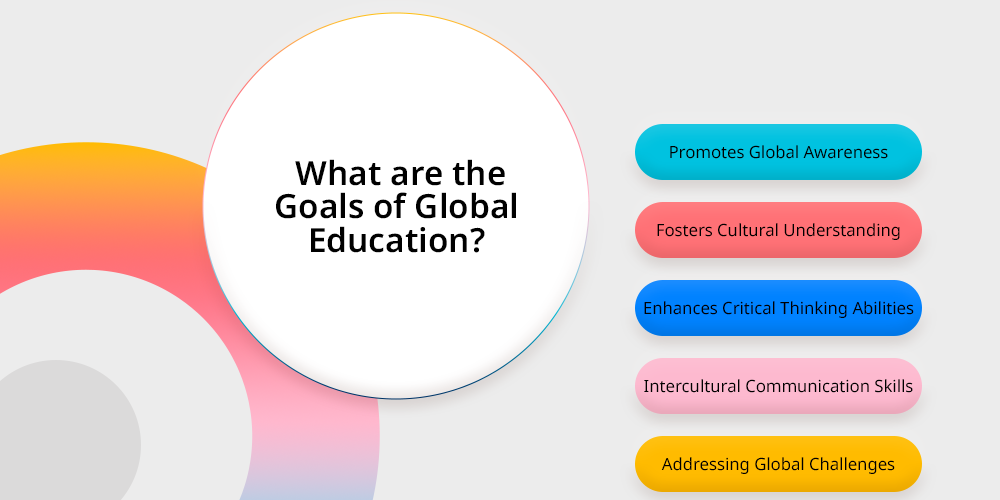
Global education has significant importance in training the people of the world for an increasingly globalized society.
Its goals are developed to increase awareness, knowledge, and skills to analyze and evaluate global affairs and to enhance cultural sensitivity and intercultural interaction.
Below are key goals of global education:
1. Promotes Global Awareness
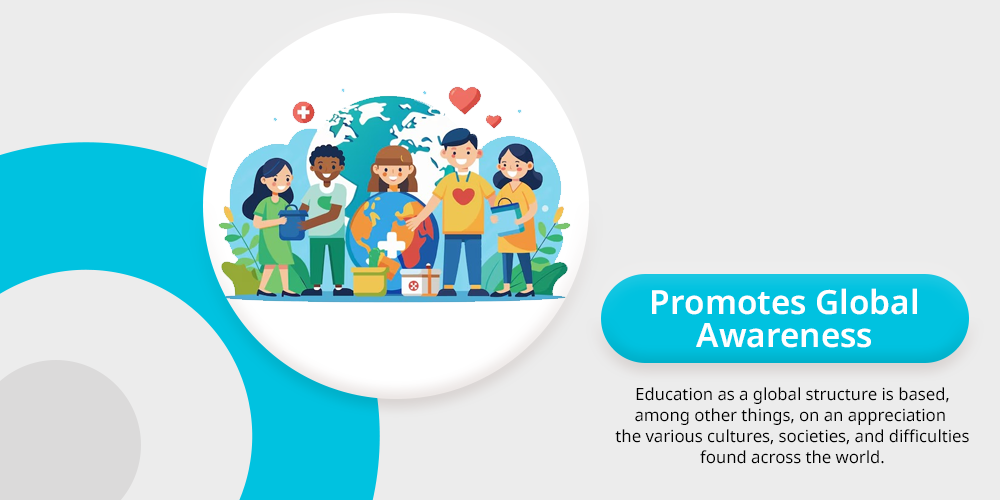
Education as a global structure is based, among other things, on an appreciation of the various cultures, societies, and difficulties found across the world.
Students are given the opportunity to transcend their local or national level of thinking and realize that the world.
They belong to one with climate change, poverty, and human rights issues, amongst others.
Thus, respecting the international connection of the world, students have the knowledge necessary to become active members of society and discuss global issues.
2. Fosters Cultural Understanding

Cultural diversity is one of the important principles of learning today, which prepares people for a multicultural environment.
Education is also good as it creates awareness in the students of some beliefs, practices, and cultures existing in their daily lives.
Besides entrenching the rights of equality, this cultural appreciation also fosters unity between persons in different societies.
Therefore, once people are educated and embrace the suffering of other people, prejudice & discrimination cannot be utilized to foster unity & cooperation within the world.
3. Enhances Critical Thinking Abilities
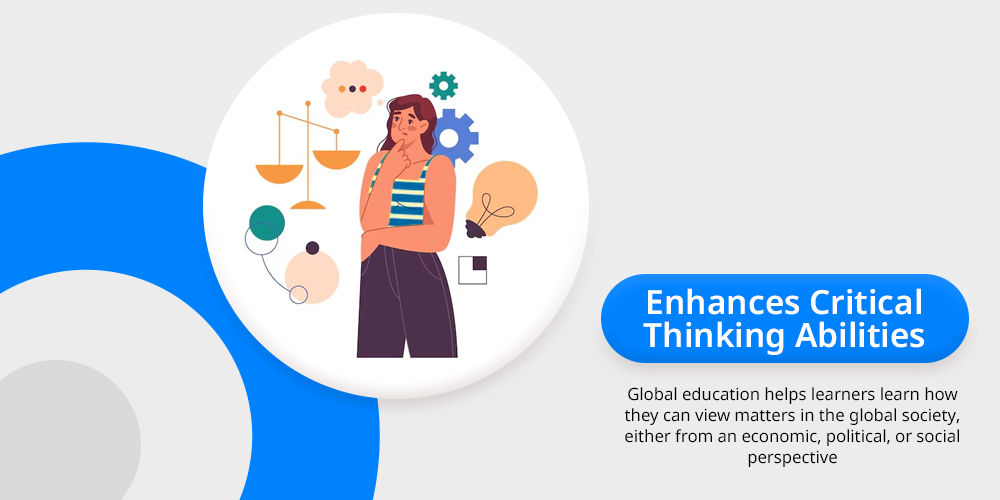
Global education helps learners learn how they can view matters in the global society, either from an economic, political, or social perspective or any other depending on the issue affecting the society.
Discussions and debates on such topics will help students to learn various opinions that are concerning one specific event and assess the evidence, which can be useful for making some decisions.
This process enhances their problem-solving ability that is vital in handling the fluid issues of society.
4. Intercultural Communication Skills
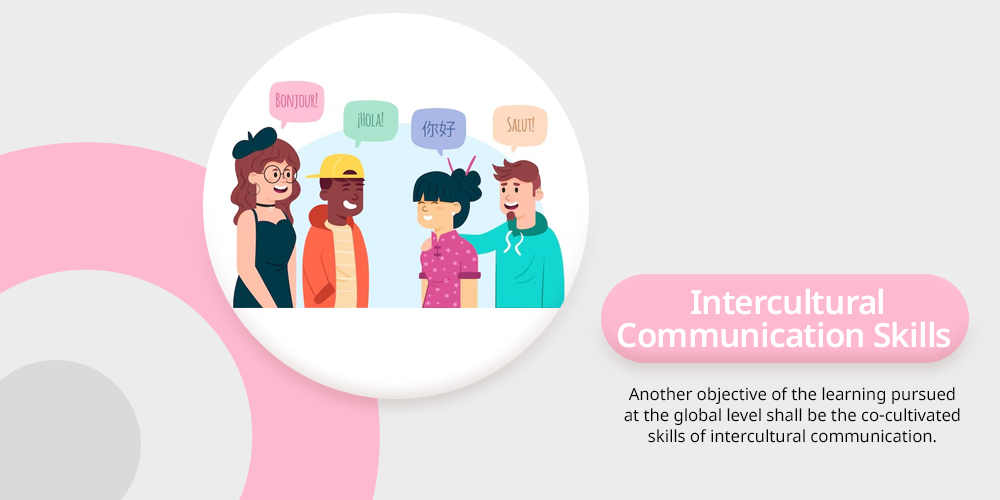
Another objective of the learning pursued at the global level shall be the co-cultivated skills of intercultural communication.
Nowadays, globalization implies that a person interacts with people from different cultures at some point in life.
By making sure students pass through different cultures, students are trained on how to deal with people of different cultures. It also helps students to develop leadership skills.
5. Addressing Global Challenges
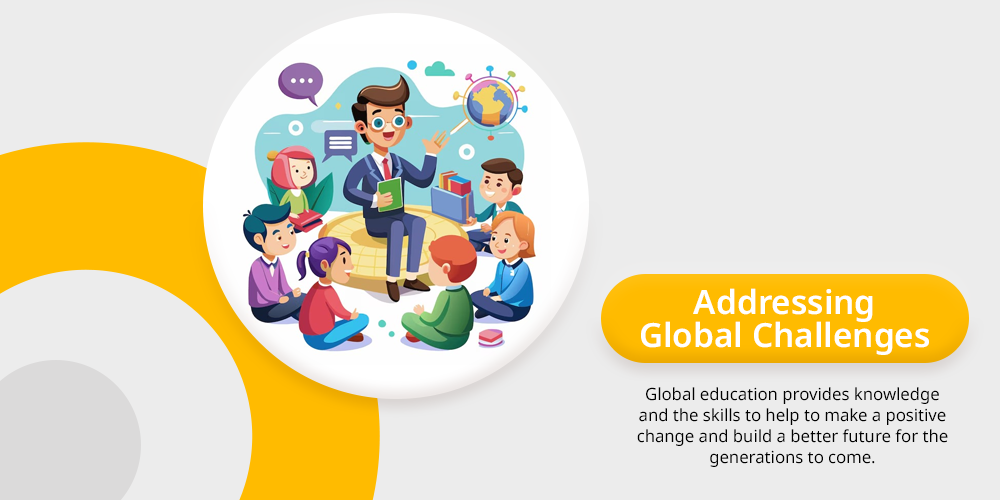
International education has the purpose of making a person ready to effectively participate in the functioning of the global society.
Students who understand global issues can work toward developing improved solutions for different global challenges.
Global education provides knowledge and the skills to help to make a positive change and build a better future for the generations to come.
Effects of Globalization in Education
Education is one of the major systems that has been affected by globalization in one way or another and here we seek to discuss the positive and negative effects of globalization in education.
Global educational forums and learners are exposed to several opportunities and challenges. The following is possibly the best breakdown of the myriad impacts of globalization on education:
1. Positive Effects of Globalization on Education
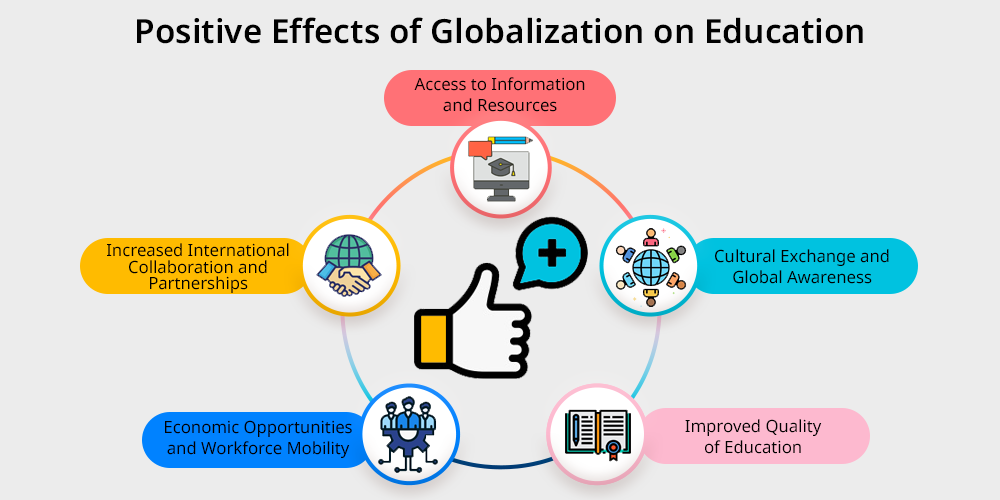
Here are some positive impact of globalization on education in India:
- Access to Information and Resources
Globalization has brought a flood of information and educational resources for students of the entire world.
The internet and other new technologies have influenced learning by offering students web-based classes, e-books, journals, and tutorial videos.
It also makes it much easier to access information regardless of a student’s geographical location.
- Cultural Exchange and Global Awareness
Cultural exchange is one of the biggest advantages of globalization within the field of education.
Students get a chance to learn from their counterparts in other parts of the world. It also improves on the cultural diversity in interaction as well as solving global problems as a team.
These expose students to various outlooks, making them more receptive and understanding of global affairs.
- Improved Quality of Education
The exchange of ideas as well as practices in education has led to improvement of the quality of education in many parts of the world. Schools today can implement best practices from all over the world.
It in turn translates to the improvement in teaching methods and learning environments.
Also, teachers are free to work together with teachers in other countries and exchange their knowledge with the aim of enhancing the styles of teaching.
- Economic Opportunities and Workforce Mobility
Globalization has introduced a variety of new educational channels that enable students to get the education solicited in a globalized world of work.
Students are now more equipped for international jobs since they gain expertise in some important aspects such as foreign languages, international relations, economics, among others.
In addition, students and workers’ mobility has fostered partnership and exchange schemes, leading to increased workforce internationalization.
- Increased International Collaboration and Partnerships
Globalization also leads universities and institutions to seek international partnerships. It may include joint research or cooperative study programs or students’ exchanges.
They enhance the quality of education and foster advancements in numerous sectors, including technological and medical industries.
2. Negative Effects of Globalization on Education
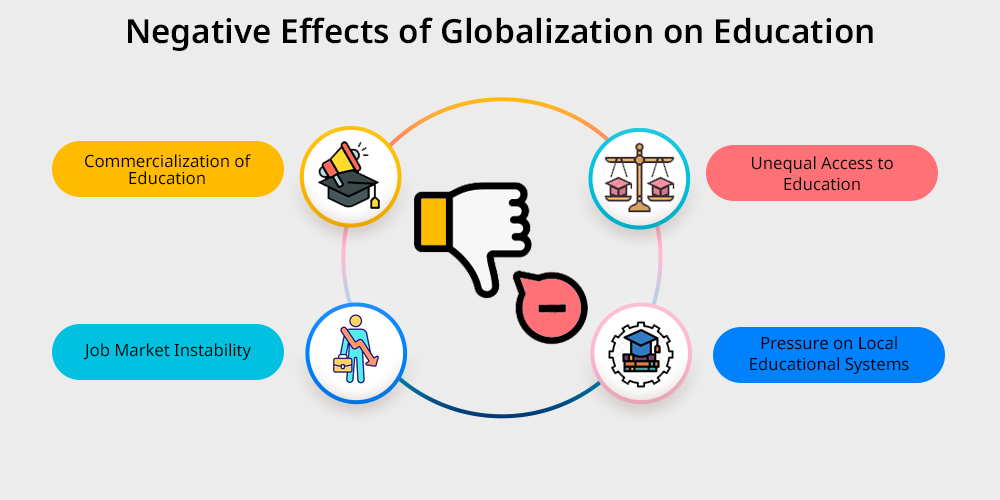
- Unequal Access to Education
Implementing globalization has increased access to education in most areas but at the same time deepened the inequality between the developed and the underdeveloped countries.
It implies that a number of learning activities, as well as learning technologies, that may be available to students in developed nations may not be accessible to learners in developing nations.
This influence widens the gap of the performance of students from different classes in their academic achievements.
- Pressure on Local Educational Systems
Competition experienced globally may force the educational systems in other countries to match those of the international standards despite shortcomings in addressing the needs of the learners.
This results in some governments embracing foreign curricula or teaching methodologies that are not suitable or relevant to their particular educational systems and culture.
- Job Market Instability
Globalization has brought new chances to international careers, it has led to the trend in educational arrangements with more and more emphasis on global employment.
This has resulted in an overemphasis on technical and skill development, more on qualifications and less on character and general development.
Furthermore, the increased numbers of international students in the global system may pose a threat of compressing the limited opportunities that could have been available to the local students.
- Commercialization of Education
It has been observed that due to globalization, commercialization of education has gained ground, and commercial educational institutions may put the business gain above the standards of the students and teachers.
There are new worries regarding the commercialization of knowledge.
This can lead to a decrease of concern for the development of the integrated subject and for actually converting it into a commodity instead of a service for the people.
Key Trends in the Future of Global Education
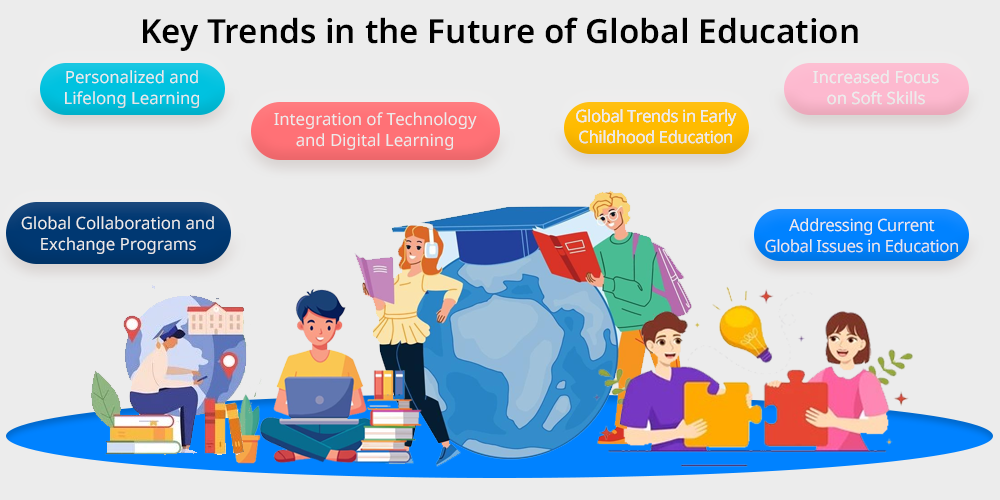
Here are some of the trends that are worth considering across the world in the future of learning. Such trends are characteristics of the current tendencies of education in the context of active globalization.
Below are some of the key trends:
- Integration of Technology and Digital Learning
The integration of technology in learners is increasing tremendously at a very young age. Such concepts as virtual education, and AI-assisted learning are becoming highly popular and widely adopted.
The role of globalization is seen here as students from across the globe are now able to access numerous ICTs.
- Global Trends in Early Childhood Education
The organizational framework of early childhood education is presently experiencing a shift to more inclusionary and international models.
There are dramatic increases in emphasis that have now been placed on more basic skills, which fit into the international trends and benchmarks of education.
The countries are now taking strategies from one another, and there is more harmonization of early childhood education that enhances critical thinking, creativity, and emotions.
- Increased Focus on Soft Skills
Education will be more focused on the aspects of soft skills. It may include communication, problem solving, and teamwork.
These skills are imperative for students with regard to preparing them for the competitive global workplace.
Educational systems are changing and also including technologies that support interactive learning and cross-cultural modeling.
- Personalized and Lifelong Learning
Education is now shifting towards the provision of individualized learning. Approach also, relying on data and technologies, will provide opportunities for students to learn more individually and progress.
In addition, lifelong learning is going to be another important element by which individuals will be receiving upgrades for different skills in their lifetime.
- Global Collaboration and Exchange Programs
Corporations with partners abroad and exchange programs will emerge to allow the students to study different cultures and educational systems.
They offer possibilities for cooperation, both in terms of research activities and innovation, as well as a more diverse perspective on the world.
- Addressing Current Global Issues in Education
With the challenges that globalization presents today, current problems of the world in education, such as equity, quality assurance, and information and communications technology. In the future designs of education, education is expected to be available to all students regardless of their status in society.
What is the Impact of Globalisation on Education?
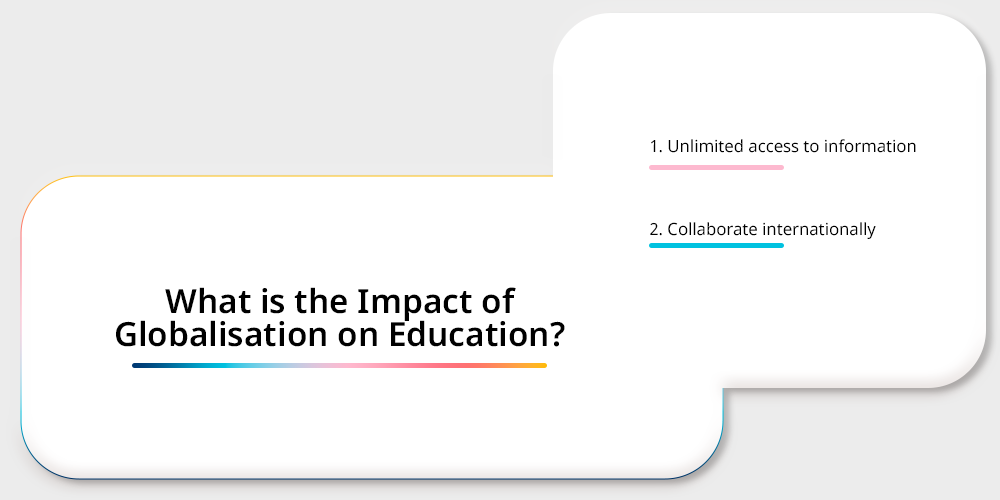
The implication of globalization in education is getting more and more widespread day by day. Our educational systems are rapidly adopting amazing international standards and their curricula.
All these help students in preparing for the global workforce. Well, it is also a good shift to enhance India’s competitive power in the worldwide market of education.
Nowadays Indian students have more amazing opportunities to study abroad, foreign institution setups, and get world-class education.
The globalization of education in India is leading to the rise of international schools. There are many amazing online platforms, and foreign partnerships are adding to this list.
However, the impact of globalization on education in India is transforming. Check how globalization is influencing the educational area:
1. Unlimited Access to Information
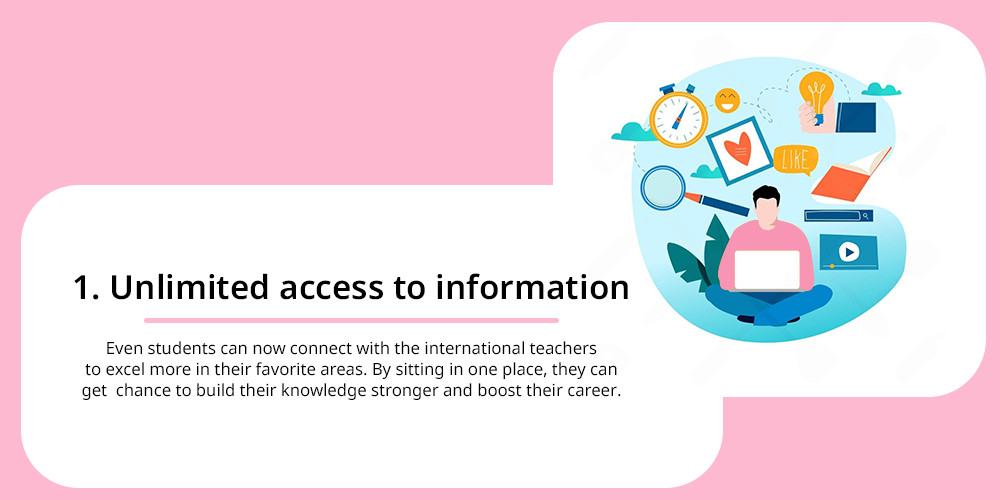
Globalization leads to an explosion of online resources. It helps the students in accessing global knowledge.
Students can now easily open up to the vast learning opportunities. Well, education can be more easily accessible for students now than before.
Even students can now connect with the international teachers to excel more in their favorite areas. By sitting in one place, they can get the chance to build their knowledge stronger and boost their career.
2. Collaborate Internationally
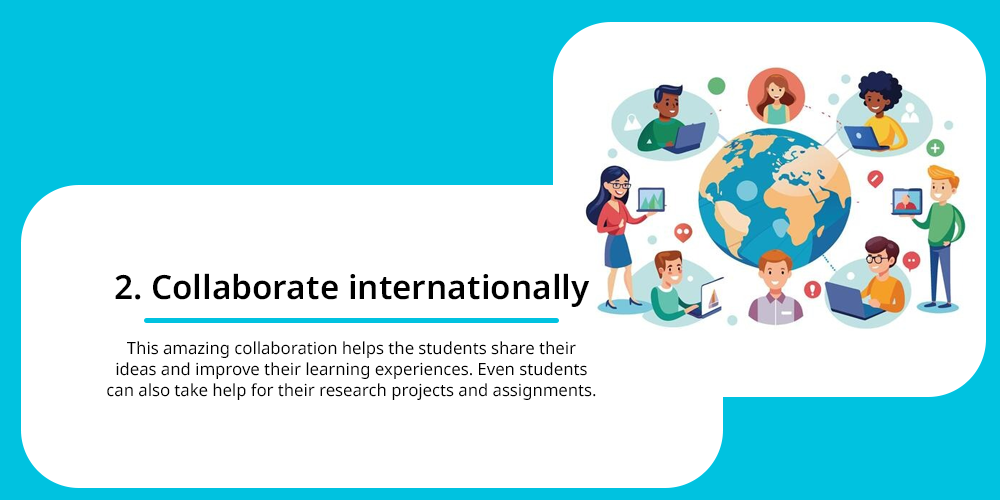
Globalization motivates the students and teachers to get in touch with other education areas. Now they can easily learn things from all over the world.
This amazing collaboration helps the students share their ideas and improve their learning experiences. Even students can also take help for their research projects and assignments.
Moreover, it is an amazing experience to foster innovation in the education department.
Looking Ahead
Therefore, the findings of this paper provide concrete evidence of how globalization has paved the way for the cultural exchange and successful implementation of education quality enhancement, delivering students to the internationalized workforce requirements.
Indeed, it holds much promise for personal and academic development as well as for the learners it enrolls, but it also presents difficulties, for example, inequality and additional burden on local systems.
Thus, globalization of education cannot disregard local imperatives because education should serve the world’s people as an essential good.

